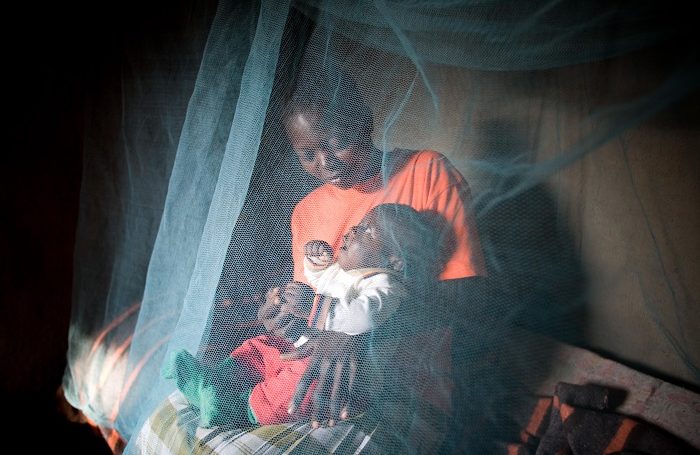
Many of the health challenges that confront humanity transcend national borders, and require all countries to work together for the global public good. Today, there are a record numbers of people displaced by conflicts across sub-Saharan Africa, nearly all of whom are vulnerable to malaria. This makes the fight against malaria a vivid example of the role multi-sectoral partnerships can play in resolving the complex challenges to be addressed at the upcoming World Humanitarian Summit.
Smart investments and strong partnerships have resulted in dramatic progress against malaria in the past fifteen years, with unprecedented gains in reducing the burden of disease. Malaria mortality has decreased by 60 percent, with 6.2 million lives saved since 2000, primarily among children under the age of five. In fact, lives saved from malaria account for 20 percent of all progress in reducing child mortality in sub-Saharan Africa since 2000.
However, malaria still poses a significant threat to global health and the achievement of the Sustainable Development Goals that countries signed up to, amidst much fanfare last year. Although malaria is no longer the leading cause of death for African children, there were still an estimated 214 million cases and 438,000 deaths from this preventable and treatable disease in 2015. This means a child dying of malaria every two minutes. Malaria continues to affect the poorest and most marginalized disproportionately: there is a direct correlation between the probability of dying from malaria and a country’s development status. Even within the same locality, children with low socioeconomic status have double the risk of clinical malaria than those who are better off.
Migrants, including internally displaced people (IDPs), refugees, returnees and mobile populations, are highly vulnerable to malaria. Crowded and flimsy shelters facilitate the transmission of malaria and other vector-borne diseases, resulting in serious epidemics. Displacement means people trade familiar habitats for ones that are unfamiliar, unhealthy or precarious. Refugees and IDPs often face major obstacles when trying to access health care, and their exposure to malaria is significantly increased when moving from low to high-transmission areas, because they are unlikely to have acquired immunity or knowledge of malaria prevention and treatment.
In Africa, which accounts for 80 percent of malaria deaths, an estimated 3.4 million refugees and 7.9 million internally displaced people live in daily dread of malaria. The UN Refugee Agency (UNCHR) reports a critical need for millions of life-saving nets to protect these families.
Refugees and their families face unspeakable odds. After all they have endured and survived, they should not have to worry about dying from a mosquito bite. With this in mind, the United Nation Foundation’s Nothing but Nets campaign and Sumitomo Chemical are delivering on a joint commitment to the UN Secretary General’s Every Woman Every Child global movement to protect vulnerable mothers and children. Our Million Nets Pledge is a shared commitment to send one million of Sumitomo Chemical’s Olyset Nets to refugees and IDPs by the end of 2016. These life-saving interventions are being distributed by UNHCR and UNICEF, the implementing UN partners operating in emergency and conflict settings. We are proud to deliver on our commitment, but much more is needed.
Globally, malaria partners have embarked on an ambitious goal to end malaria for good. The WHO Global Technical Strategy for Malaria 2016-2030, endorsed by the World Health Assembly in May 2015, calls for 90% malaria elimination by 2030. However, history has taught us that malaria is an adaptive foe, and as long as there is a reservoir of the malaria parasite in human populations, the risk of resurgence is very real. Over the last century, there have been dozens of such resurgences in countries around the world, many linked to decreases in funding to fight the disease after realizing initial malaria reductions.
The Roll Back Malaria Partnership is a global health initiative to co-ordinate action and forge consensus among a wide range of partners. It is evident that reaching the most vulnerable and remote populations – including migrants, refugees and IDPs — will be essential if we are to achieve worldwide malaria elimination. Only a comprehensive approach that includes addressing the critical health needs of people affected by humanitarian crises will get us there.
Preserving and protecting health is always a primary goal of humanitarian action, and partners in all sectors must join in the global effort that will be launched at the World Humanitarian Summit to prioritise the health and well-being of crisis-affected people. As part of this, we are committed to expanding our efforts in inclusive public-private partnerships that cross boundaries and bridge the traditional relief-development divide.
Our collective health security requires that no one must be left behind.
Further Reading on E-International Relations
- Global Displacement, COVID-19 and the Risk of a False-positive Flattened Curve
- Necropolitics and the Precarious Lives of Rohingya Refugees in India
- Ebola Response in the Democratic Republic of Congo: A Bridge to Peace?
- Writing About Displaced People in the Time of Coronavirus
- Surveying the American Public on the Plight of Climate Refugees
- Forced Migration and Security Threats to Syrian Refugee Women